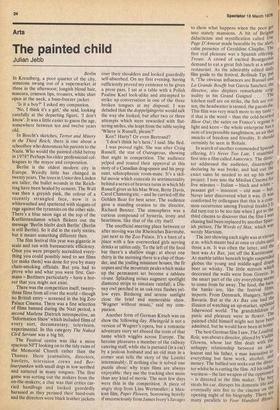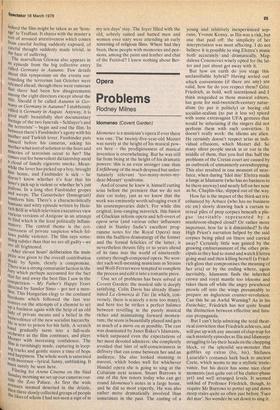Arts
The painted child
Julian Jebb
Berlin In Kreuzberg, a poor quarter of the city, someone swung out of a supermarket at three in the afternoon; longish blond hair, mascara, crimson lips, trousers, white shirt open at the neck, a bum-freezer jacket.
'Is it a boy?' I asked my companion. 'No, I think it's a girl,' she said, looking carefully at the departing figure, 'I don't know'. It was a little easier to guess the age, somewhere between ten and twelve years old.
In Brecht's sketches, Terror and Misery in the Third Reich, there is one about a schoolboy who denounces his parents to the Nazis. Who would the painted child betray in 1978? Perhaps his older professional colleagues to the mayor and corporation.
Berlin is the oldest modern city in Europe. Weirdly little has changed in twenty years. The trees in Unter den Linden are taller, the bullet wounds in the Reichstag have been healed by cement. The Wall was then a greyish pink, the colour of a recently strangled face, now it is whitewashed and spattered with slogans of rage against the tyrannies on the other side. There's a blue neon sign at the top of the Kurfiirstendamm which flickers out the message 'Berlin bleibt doch Berlin' (Berlin is still Berlin). So it did in the early sixties, but it meant something different then.
The film festival this year was gigantic in scale and run with bureaucratic efficiency. Once you were properly accredited everything you could possibly need to see films (or make them) was done for you by many chain-smoking officials. But you had to prove who and what you were first. Germans Berliners particularly have a horror that you might not exist.
There was the competition itself, twentythree films from all over the world though no British entry screened in the big Zoo Palace Cinema. There was a fine selection of films banned during the Nazi period, a second Marlene Dietrich retrospective, an 'Information Show' which included films of every sort, documentary, television, experimental. In this category The Naked Civil Servant was a big hit.
The Festival centre was like a more spacious NFT looking on to the tidy ruins of the Memorial thurch rather than the Thames. Here journalists, directors, hustlers, television crews and Berlinerpunken with small dogs in tow seethed and nattered in many tongues. The first game was sorting out the makers from the on-the-makers; a clue was that critics carried handbags and looked guardedly harassed as they perused their hand-outs and the directors wore black leather jackets
over their shoulders and looked guardedly self-absorbed. On my first evening, having sufficiently proved my existence to be given a press pass, I sat at a table with a Polish Pauline Kael look-alike and attempted to strike up conversation in one of the three
broken tongues at my disposal. I was deluded that the doppelgeingerin would talk
the way she looked, but after two or three attempts which were rewarded with fluttering smiles, she leapt from the table saying 'Where is Russell, please?'
Ken? Harty? Or even Bertrand?
'I don't think he's here,' I said. She fled. I was proved right. She was after Craig Russell, the star of Outrageous, showing
that night in competition. The audience yelped and roared their approval at this story of a Canadian drag-queen and his pregnant, schizophrenic room-mate. It's a skilful movie which conceals its sentimentality behind a series of bravura turns in which Mr Russell gives us his Mae West, Bette Davis, Carol Channing etc. and he carried off the Golden Bear for best actor. The audience gave a standing ovation to the director, Richard Benner. The atmosphere was a curious compound of hysteria, irony and heartiness, like that of the city itself.
The unofficial meeting place between or after moving was the Rheiniches Bierstube, just next to the Zoo Palace. It's a barn of a place with a few overworked girls serving drinks at tables only. To the left of the food bar there's a shallow stage; at about one thirty in the morning there is a clap of thunder, and the jostling miniature houses, the fir copses and the mountain peaks which make up the permanent set become a tableau vivant. Splashing noises augment spotlight diamond strips to simulate rainfall; a Disney owl perched in an oak-tree flashes yellow eyes. Birdsong and serene sunlight close the brief and memorable show. 'Wagner without music,' said my companion.
Another form of German Kitsch was on show the following day. Rheingold is not a version of Wagner's opera, but a romantic adventure story set aboard the train of that name which wiggles across Europe. The heroine pleasures a member of the railway
catering staff, while she is pursued (in a car) by a jealous husband and an old man in a corner seat tells the story of the Lorelei interminably. If nothing else it solved one puzzle about why train films are always enjoyable: they use the tracking shot more than any kind of movie. The next few days were thin in the competition. A piece of
angry slop from Lina Wertmuller; a Mexican film, Paper Flowers, borrowing heavily if unconsciously from James Ivory's Savages to show what happens when the poor get into stately mansions. A bit of Belgian didacticism and mystification called Une Page D'Amour made bearable by the alert, calm presence of Geraldine Chaplin. The first real pleasure was a Spanish offering, Trouts. A crowd of excited Bourgeoisie demand to eat a great fish lunch at a smart restaurant. As the admirably edited daily film guide to the festival, Berlinale Tip, Put, it, 'The obvious influences are Bunuel ano La Grande Boufft but Garcia Sanchez, the director, also displays remarkable originality in his Grand Guignol . . . The kitchen staff are on strike, the fish are rotten, the headwaiter is stoned, the guests die. This film was very much more to my taste if that is the word than the cold-hearte.d Blow Out; the satire on Franco's regime Is light and keen the whole enterprise has a note of irrepressible naughtiness, an air that ' smacks of freedom and frivolity. It should certainly be seen in Britain. In search of another commended Sparl15,l1 offering, It's Never Too Late, I stumble' first into a film called Autocracy. The diree, tor addressed the audience, disarminglY declaring he was broke, and laid out the exact sums he needed to set up his nelIt project. I tore into the Minilux Cinema for five minutes Italian black and white peasant girl innocent old man hut' Never later discovered what it was. (I was comforted by colleagues that this is a corn' mon occurrence among Festival freaks.) It did turn out to be too late when I got to the third cinema to discover that the film I was chasing had been replaced by another Span' ish picture, The Words of Max, which w85 wordy Marxism.
The last showing each night was at elevea, p.m. which meant bed at once or clubs unt"
three a.m. It was often the latter, and the best was Ax Bax, just off the Kantstrassea At marble tables beneath bright suspend, globes the young and middle-aged dra.t1; beer or whisky. The little mirrors whIci decorated the walls were from Greece. in the smart part of the city everything see° to come from far away. The food, the bars, the banks are, like the festival flln?s' imports. From Denmark, Hungary, Spain' Bavaria. But at the Ax Bax one had the, illusion of watching an up-market, update': Isherwood world. The grandchildren eu panic and pleasure were in flower. Th.,e painted child himself might not have bee" I admitted, but he would have been at hale' k The best German film I saw, The Leadin! Role, was about a director, played by Vad1,111. Glowna, whose last film dealt with unhappy relationship between an adfr lescent and his father, a man insensitive te, everything but farm work, alcohol, all money. The bullied son seeks out the direc tor whilst he is cutting the film. All his sullend wariness the last weapon of the opPrease is directed at the film maker. The hOci steals his car, disrupts his domestic life eventually sets fire to the cinema on thc. opening night of his biography. There or` many parallels to Four Hundred (
indeed the film might be taken as an 'homage' to Truffaut. It shares with the master a sort of aroused attentiveness which comes from careful feeling suddenly exposed, of careful thought suddenly made trivial, in the face of suffering.
The marvellous Glowna also appears in an episode from the big collective entry called Germany in Autumn. Few details about this symposium on the events surrounding the terrorism last October were released ahead, though there were rumours that there had been few disagreements among the eight directors except about the title. Should it be called Autumn in GerPnany or Germany in Autumn? I stubbornly called it Germany in August. Anyway, it is good stuff: beautifully shot documentary footage of the two funerals — Schluyer's and the terrorists' — begin and end the film. In between there's Fassbinder's agony with his Mother and Turkish lover. Fassbinder puts himself before his cameras, asking his mother what sort of solution to the fears and Miseries of terrorism occur to her? She Comes out for benevolent dictatorship amid a cloud of family cigarette smoke. Meanwhile the lover has picked up a boy, brought hitn home, and Fassbinder is sick — he doesn't know whether it's fear that his lover's pick-up is violent or whether he's just Jealous . In a long shot Fassbinder gropes and weeps. The Gastarbeiter (Immigrant) comforts him. There's a characteristically humane and witty episode written by HeMrich Boll in which television executives view various versions of Antigone in an attempt to find which is the least politically inflammatory. The central theme is the cortnsiveness of private suspicion which follows public violence. The film says something subtler than that we are all guilty we are all frightened. After eleven hours' deliberation the main prize was given to the overall contribution Tade by Spain, clearly a compromise.
here was a strong communist faction in the ittry which perhaps accounted for the fact '"at far and away the best film I saw in the
e,°,mpetition — My Father's Happy Years tlitected by Sandor Simo — got not a men!Inn. This Hungarian elegy to the confused iteedoms which followed the last war Centres on the attempts of a chemist to set 14 a business again with the help of an old LaclY of private means and a belief in the °,,Fnevolence of the new socialist hierardry. tie is sent to prison for his faith. A scratch band gradually turns into a full-scale (Ltchestra as the film continues, and plays Tozart with increasing confidence. The !I'M is ravishingly made, capturing in loopnig tracks and gentle stares a time of hope
and happiness. The whole work is saturated
with inocence —lyrical, funny, unblinking. It I Must surely be seen here. Filming for Arena Cinema on the final Nunday morning we set up our cameras outside the Zoo Palace. At first the wide !venues seemed deserted in the drizzle, "len there slowly collected groups of people the likes of whom I had not seen a sign of in
my ten days' stay. The foyer filled with the old, soberly suited and hatted men and women over sixty were attending an early screening of religious films. Where had they been, these people with memories and pensions, among the paint and leather and chat of the Festival? I knew nothing about Berlin.



































 Previous page
Previous page